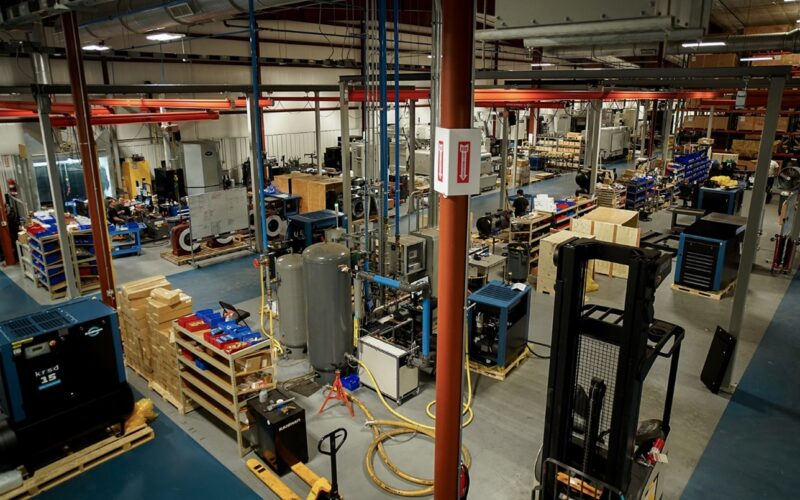Let’s get brutally honest: B2B industrial manufacturing companies are rarely winning awards for cutting-edge SEO. Many manufacturers still rely on outdated practices, assuming “word-of-mouth” and/or “the old boys club” is enough to sustain sales. The uncomfortable truth? Those who ignore smart, strategic industrial marketing tactics—especially digital ones—are quietly losing revenue every single day.
Here’s what every senior marketer in industrial manufacturing needs to internalize: great products alone no longer guarantee market dominance. Your competitors aren’t waiting—they’re actively investing in strategies like search engine optimization (SEO), content marketing, and targeted lead generation. Ignoring these tactics doesn’t maintain the status quo; it erodes it.
It’s time for change. That’s where SEO stops being optional—and starts becoming essential. Let’s dive in to understand what is essential for your brand to know about SEO to win in industrial markets.

SEO is a sales enablement tool, not just a marketing tactic
Think of SEO less as “marketing fluff” and more as precision engineering for your digital presence. SEO connects your business to customers actively seeking your specific products or services. By optimizing your online content for the right search terms—often technical, specific, and industry-specific—you’re essentially turning your website into a 24/7 salesperson. According to a 2023 Gartner survey, over 67% of industrial buyers start their purchasing decisions with an online search. Ignoring SEO is akin to leaving money on the table—and handing it straight to your competition.
When your website ranks highly for relevant keywords, prospects perceive your brand as an industry leader. It’s not just about visibility—it’s about credibility. A strong SEO presence signals to potential buyers that you’re knowledgeable, trustworthy, and reliable enough to solve their intricate manufacturing challenges.

The trap of “We don’t need SEO—everyone knows us”
Let’s tackle another dangerous myth head-on: “Our brand is established; people already know us.” Even the biggest names in industrial manufacturing can’t rely solely on reputation anymore. Remember IBM? GE? Xerox? Once perennial B2B powerhouses within their own weight class. But where are they now? With global markets becoming increasingly competitive, resting on your laurels means competitors who invest in SEO will steadily chip away at your market share. It’s time to drop the complacency—SEO isn’t optional. It’s survival.
Consider this: a new generation of procurement managers and engineers are digital natives. Their default move isn’t picking up the phone to talk to a familiar salesperson—it’s heading straight to a search bar. If your company doesn’t appear prominently during their research, you’re essentially invisible.
Misunderstood and underestimated: dispelling SEO myths
Too many senior marketers view SEO as overly technical or obscure—a “black box” tactic that promises vague results. Let’s be clear: effective SEO for industrial manufacturers is methodical, measurable, and strategic. Done right, SEO delivers concrete metrics such as organic traffic growth, lead quality, conversion rates, and ultimately, revenue.
For B2B industrial manufacturers, success often lies in highly specific keywords—think detailed product specifications, specialized manufacturing processes, or niche industry applications. Generic terms won’t drive qualified leads. Precision matters. For instance, a plastics manufacturer might focus less on generic terms like “plastic products” and more on hyper-specific, long-tail searches such as “medical-grade plastic injection molding for healthcare devices.”

Critical SEO strategies manufacturers need to master
Here are several no-nonsense SEO tactics your B2B industrial marketing team must prioritize immediately:
1. Technical SEO: build a digital machine
Technical SEO ensures search engines understand your website. If your site isn’t fast, secure, mobile-friendly, or well-structured, Google won’t trust it. Neither will your customers.
Key actions:
- Speed up load times—fast websites convert, slow websites frustrate
- Fix technical errors that confuse search engines
- Optimize your website structure for clarity, simplicity, and logical navigation
A well-optimized website isn’t optional; it’s foundational.
2. Content marketing that solves real problems
B2B industrial buyers are practical—they want solutions, not sales pitches. Your content must speak directly to their problems, concerns, and technical queries.
Effective manufacturing content includes:
- In-depth technical articles
- Detailed case studies highlighting real-world applications
- Comprehensive guides addressing specific industry challenges
Quality content positions you as an authority, making your brand indispensable.
3. Precision targeting with local SEO
Don’t underestimate local searches—even global manufacturers need local SEO, especially if they have local storefronts. Buyers often prefer suppliers who understand their regional regulatory environments, logistics, or specific industry needs.
Here’s how:
- Maintain an updated Google Business Profile
- Use region-specific keywords naturally in your website content
- Actively request reviews from satisfied local customers
Local SEO creates instant credibility and competitive advantage.
4. Backlinks: The credibility you can’t buy
Backlinks from reputable industry sources are digital gold. They signal credibility and authority to both buyers and search engines. Plus, even those who are not marketing savvy can fundamentally understand it (read: if your brand suddenly ranks in the top 3 on Google, everyone will notice it’s working).
Tactics to build backlinks:
- Publish thought-leadership content in respected journals
- Collaborate with industry influencers and complementary brands
- Leverage PR to amplify your visibility in strategic channels
High-quality backlinks aren’t just nice—they’re essential for industrial B2B marketing success.
SEO ROI: The metric your CFO cares about
One major advantage of SEO: every action is measurable. Unlike traditional marketing methods, SEO provides data on exactly what’s working, what’s not, and where to improve.
Metrics to track:
- Keyword ranking improvements
- Organic traffic growth
- Conversion rates from organic leads
This transparency makes SEO a straightforward sell to leadership, clearly demonstrating its impact on sales growth.
Don’t go it alone—partnering strategically
Industrial B2B marketers often underestimate the resources and expertise required to execute SEO effectively. Smart marketers recognize when to bring in specialized help.
B2B marketing agencies, particularly those with industrial experience, bridge the knowledge gap:
- They understand technical buyer psychology
- They translate complex manufacturing terms into effective digital strategies
- They provide accountability, measurable results, and strategic insight your internal team may lack
Final thoughts: Your digital presence is your competitive advantage
B2B industrial marketing isn’t about gimmicks—it’s about strategically positioning your business where modern buyers actually search for solutions. Embracing targeted SEO tactics, developing relevant content, and leveraging precise local targeting and backlinks aren’t just marketing techniques—they’re critical survival strategies.
B2B marketing agencies specialized in industrial manufacturing provide the necessary expertise, turning these tactics into measurable revenue streams. It’s not about being trendy; it’s about being found by the right people, at the right time, consistently. Remember: great products deserve great visibility. A strong SEO strategy, backed by an experienced partner, is the fastest, most effective path to driving growth and demand.





